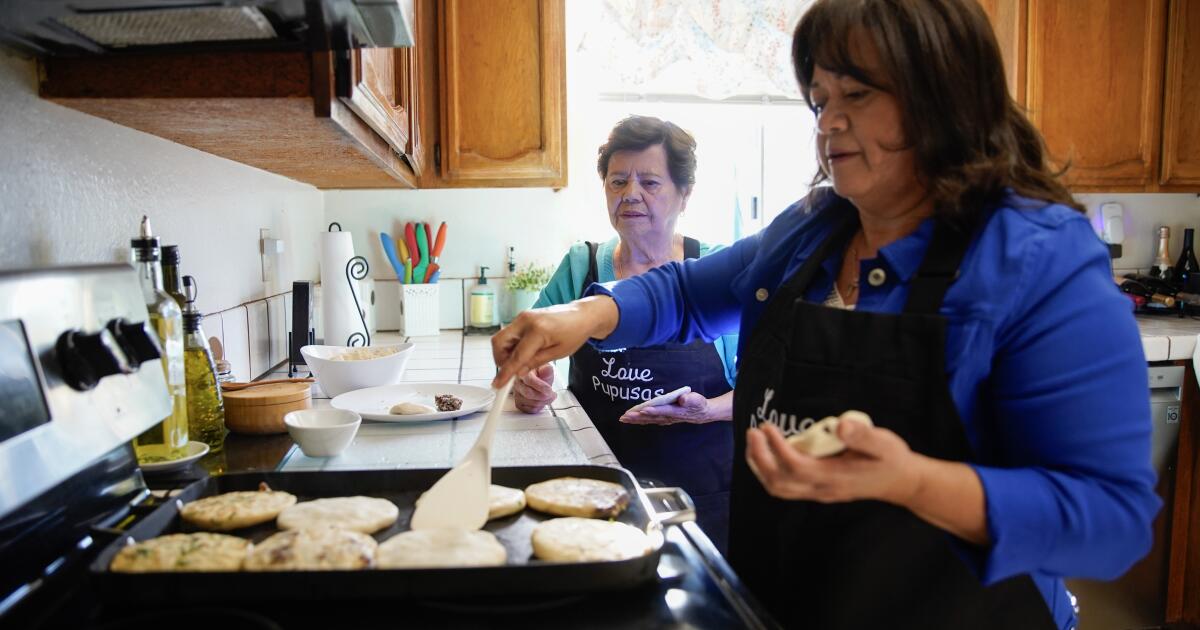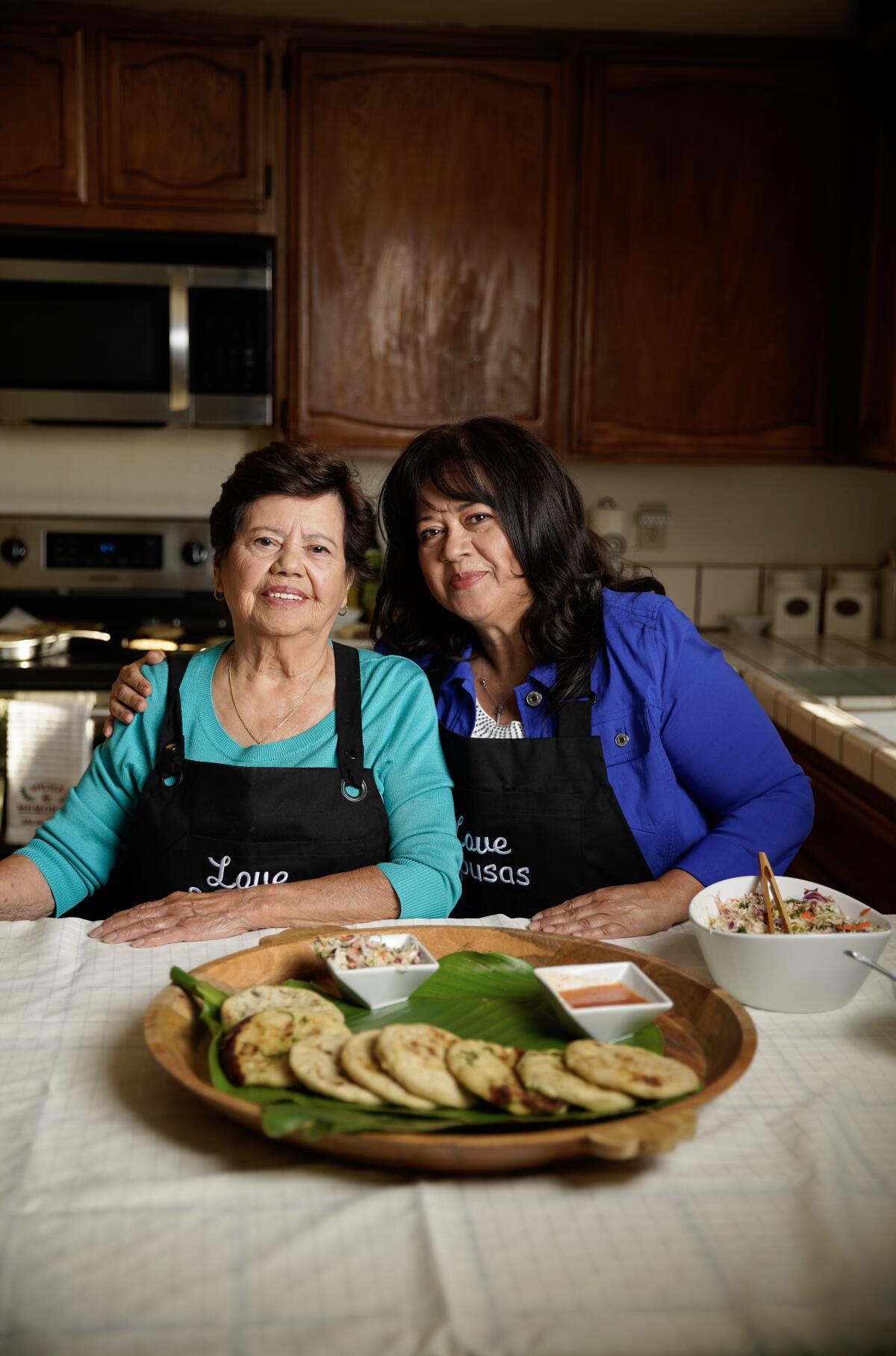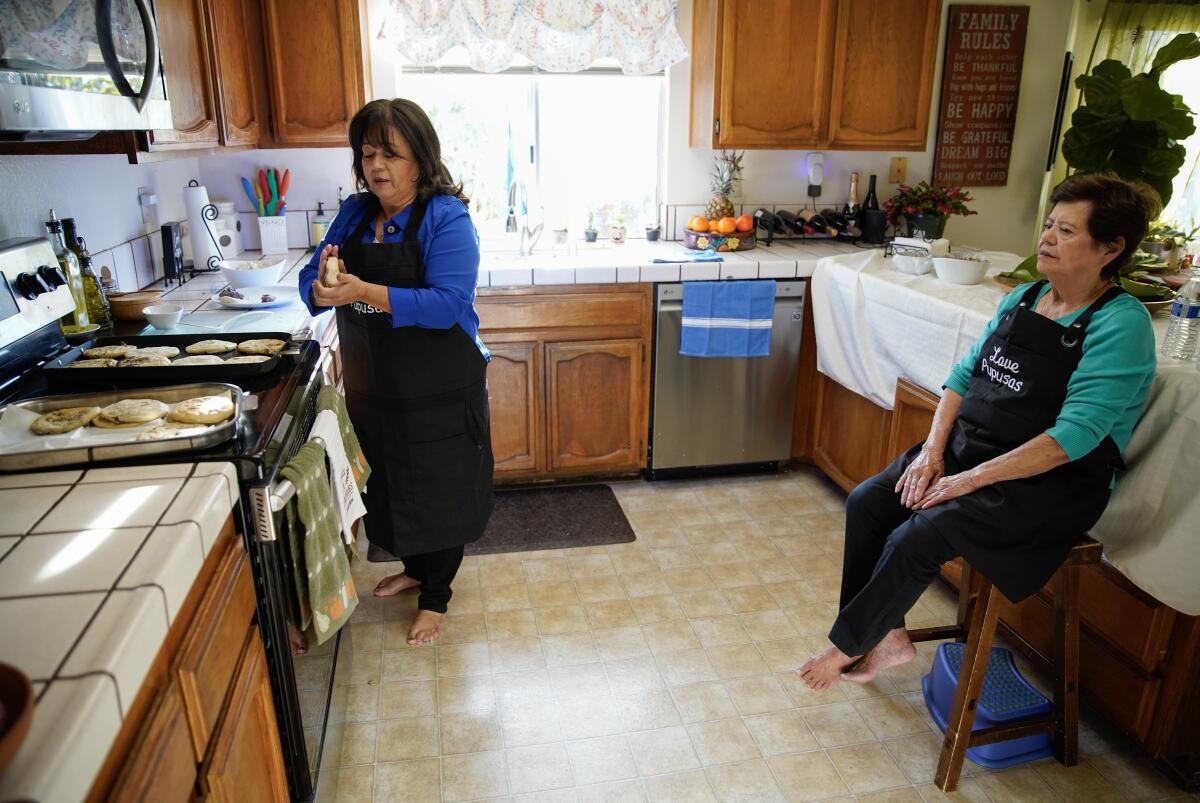
After finishing her up day job, Yanira Majano heads into the kitchen of her Rancho Peñasquitos home to start preparing the masa, or dough, to make pupusas.
The traditional Salvadoran dish — thick handmade tortillas stuffed with fresh vegetables, savory spices, cheese and meats — is one of many recipes passed down for generations in Majano’s family that she is now sharing with her San Diego community.
“My mom used to have a restaurant in El Salvador, but when we came here to the U.S. when I was 11, we started just cooking from home … and found more love of cooking together,” Majano said. “Cooking is our passion.”
Last year Majano and her mother, Martha Martinez, once again began earning a living doing what they love under a newly expanded county program that lets entrepreneurs sell freshly cooked meals from family kitchens in residential neighborhoods.

Yanira Majano and her 85-year-old mother, Martha Martinez, look over the pupusas they made using old family recipes in Rancho Peñasquitos on Wednesday, Nov. 22, 2023.
(Alejandro Tamayo/The San Diego Union-Tribune)
Known as microenterprise home kitchen operations, or MEHKOs, many of these small businesses had operated informally for years before they were officially authorized by the state in 2018 under Assembly Bill 626, which set statewide rules to legalize their operations.
The San Diego County Board of Supervisors voted earlier this month to extend the county’s temporary program, which was set to sunset in February, and expanded the earning potential for its participants.
“It was just a dream I had before to own a restaurant,” said Majano, who now runs Love Pupusas out of her home. “Being able to start it from home with very little capital was just the best thing for me.”
Though her mother is now 85, she’s still often there to support Majano while she cooks. And even after years of cooking together, Martinez sometimes surprises Majano with new tips and tricks for each recipe. “That is just my pride … that together with her, we’re doing it,” Majano said.
Little by little, Majano hopes to continue to build upon that dream by starting a food truck, sit-down restaurant or selling dishes in stores.

Yanira Majano runs Love Pupusas out of her Rancho Peñasquitos home and cooks with her 85-year-old mother, Martha Martinez, using old family Salvadorian recipes on Wednesday, Nov. 22, 2023.
(Alejandro Tamayo/The San Diego Union-Tribune)
At the county Board of Supervisors meeting earlier this month, both supervisors and the public expressed excitement about making the program permanent.
Though the public is asked to refrain from clapping and cheering at meetings, a cheer erupted from the audience once the board’s unanimous decision was announced.
“I’m supposed to tell you you’re not supposed to clap … but I’m excited,” Vargas said, chuckling.
The decision was unanimous, but the excitement when the program was first launched was not.
Under the county program, all cities within the county must allow MEHKOs and must investigate code enforcement complaints by neighbors, such as odors, noise and traffic, while the county handles food inspections.
That has prompted objections by officials in some cities, who cited worries about liability, food safety and code enforcement.
“From a very practical point of view, I would have trouble with my neighbors setting up a restaurant in their house,” El Cajon Mayor Bill Wells told The San Diego Union-Tribune on Tuesday. “And I worry about the ability of the county or the city to really monitor how these things are being done.”
Wells said he hasn’t heard of any problems reported to the city in the nearly two years since the program began but that it’s too soon to say whether the program is beneficial. He reiterated complaints he made in 2021 of overreach by the county.
Chula Vista city leaders had also worried the code enforcement responsibilities could strain city resources, and Mayor John McCann, then a council member, had expressed concerns about food safety. He could not be reached for comment this week.
At this month’s supervisors meeting, Heather Buonomo of the county’s Department of Environmental Health and Quality, which oversees the MEHKO program, told supervisors county teams have been working with cities on code enforcement and outreach.
The nonprofit COOK Alliance — which sponsored the state legislation to permit the small home-kitchen businesses and has since been working to legitimize and support home-cooking businesses in California and beyond — has spent the last two years communicating with the county health department and working directly with cities to collect data on the pilot program. Executive director Roya Bagheri said the data has shown that many of the issues cities worried might arise didn’t.
“They didn’t find any evidence of community impact concerns like the traffic, noise,” Bagheri said. “Overall, it was a really safe, successful program.”

Yanira Majano, who runs Love Pupusas out of her home, makes pupusas using old family recipes while her 85-year-old mother, Martha Martinez, looks over in Rancho Peñasquitos on Wednesday, Nov. 22, 2023.
(Alejandro Tamayo/The San Diego Union-Tribune)
County officials said there have been no known local cases of foodborne illness connected to the home kitchens, nor have any complaints been filed.
“I wish that everything that we attempted to do in government had such great success,” Anderson said.
Supervisors also chose to expand the program to align with state regulations that have since been updated — including raising food preparation limits on quantity and revenue, and allowing street vendors to get MEHKO permits.
Program participants can operate one business per home, once cooks have earned a food-safety certificate and passed a startup inspection. They can store, handle and prepare food and sell it to consumers on-site or via delivery, and they are inspected yearly for county food-safety compliance.
Under the expansion, permitted home chefs can serve up to 30 meals per day for up to 90 meals a week with gross annual sales of up to $100,000 — doubling the program’s previous revenue limitations.
Under the new guidelines, MEHKOs can also operate from food carts or farmer’s markets. These operators can sell up to 80 meals a day totaling 200 per week, with an annual gross income of up to $150,000.
Bagheri noted that the city of San Diego’s proposed street vendor crackdown wouldn’t affect vendors who can now be permitted under the county home-kitchen program, other than by limiting where they can set up.
At this month’s supervisors meeting, nearly everyone who spoke during the public comment period — including many MEHKO operators — praised the program and its expansion to include street vendors. Many called it a “game changer” — reducing barriers by allowing some low-income residents to supplement their incomes, while providing others an opportunity to run a business without the overhead costs a traditional restaurant would require.
According to U.S. Census data compiled by the county, women or minorities own fewer than a quarter of food businesses in the region. County officials attribute those figures to the high costs of starting a food business — from leasing restaurant space and purchasing equipment to garnering the necessary permits and licenses — that can prove prohibitive for many underrepresented groups.
Among the county’s 61 permitted home kitchens, however, 58 percent are women-owned and 70 percent are minority-owned, officials say.
The program is also helping to foster long-beloved traditions in communities across San Diego — like buying homemade tamales during the holiday season.
It didn’t take Sandy and Eric Wakefield long to realize they’d moved to a special neighborhood in 2014.
Once December hit, nearly every house in the neighborhood was decorated. “It’s a community tradition,” Eric said, likening it to “National Lampoon’s Christmas Vacation.”
“When you see your neighbor with a humongous amount of lights, like Chevy Chase in the movie, you know you’ve got to step it up.”
In fact, the Wakefields’ Santee neigbhorhood, dubbed “Starlight Circle,” is recognized as a tourist attraction on Yelp and Google.
One Christmas when Sandy’s mother came down to visit from Fresno with a batch of her signature tamales, they decided to share them with the neighborhood. “Within 45 minutes, all 200 tamales were gone,” Sandy Wakefield said.
That’s when they made the decision to start making tamales and make sharing their own Mexican heritage with their neighborhood an annual occurrence.
Sandy’s mother agreed to teach them how to make tamales from scratch, and after a year of studying the lengthy process, the Wakefields were ready to start making their own.
“I’m not a chef by trade, and making tamales is a long, hard process … so I had very low expectations,” Wakefield said. “I remember when we sold our first tamale, I was really excited. But people really seemed to enjoy them. … It’s gratifying.”
Four years later, the Wakefields have grown their tamale stand into Tamale Hustle, which they operate seasonally to sell tamales during the holidays or other big events like the Super Bowl.
The MEHKO and other entrepreneurial ventures has also allowed Eric to be a stay-at-home dad, and he’s even begun teaching the older of his two sons, who are 12 and 4, the basics of business.
“He helps a lot,” Wakefield said. “So when it’s time for him to go get a job, he’s going to have a little bit more hands-on experience and (already) know the dos and don’ts.”
At least nine California counties, including Riverside and Imperial counties, have adopted a MEHKO program. San Diego County’s pilot program is now being used as a model in other counties — including Los Angeles — to implement MEHKOs of their own, according to the COOK Alliance.
The COOK Alliance helped found the San Diego MEHKO Coalition to support local operators and has also partnered with other local nonprofits to form the San Diego Food Justice Project, which was awarded $1 million in state grant funding last year to help San Diegans receive small-business training and grants through the G.E.T. Cooking (Grant for Entrepreneurship Training and Home Cooking) program.
“It’s been really exciting to see people growing their businesses, finding ways to expand, with opportunities that didn’t exist before,” Bagheri said.
When the pandemic hit, Erlene LaTour, who was already retired, started grocery shopping and cooking for friends and neighbors. “You would be surprised how many people don’t know how to cook,” she said. “So it spread like crazy.”
LaTour stuck with it and was among the first operations to be permitted when the MEHKO program began.
She and her husband, Jose, have since transformed their living room into something like a restaurant, allowing customers to book private dinner parties at their home. Her business, Erlene’s Family Style Cuisine, is one of the only program participants in the county that offers sit-down dining, often catering to people who have special dietary needs and can’t eat in traditional restaurants.
LaTour has hosted families with members who are immunocompromised, people who have had a stroke and families whose children are autistic and need sensory accommodations.
“At my place, you’re not rushed and it’s very private, so families can enjoy the dinner,” she said.
Her business has since received numerous accolades, including a proclamation from President Joe Biden.
“We had no idea we were going to do this once we retired … but I absolutely love what I do,” LaTour said.






